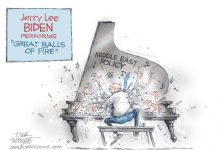By Aaron Miller
Historians usually are not in the business of divining the future. Our task of untangling and interpreting the past is difficult enough.
In my professional training, I never had a class on using tarot cards or a crystal ball. If I could predict the future with any accuracy, I would try to make a few extra bucks gambling on sports.
I think the best historians can do is to make educated guesses based on the past. While we look for patterns, historical principles that work like the laws of physics are hard to come by.
When people wondered what the year 2000 might be like, they envisioned a future where we lived in geodesic domes and robots did the housework. We would drive flying cars and travel to Mars for the weekend. For much of the 20th century, the year 2000 seemed like a date from science fiction. It seemed to be so far in the distant future. Now, it is in our rearview mirror. The year 2000 did not turn out to be like an episode of the Jetsons. The future rarely matches our imagination.
The future will be here soon; some people already are planning it. Innovators like Elon Musk and Steve Jobs brought us remarkable technological developments. SpaceX’s recent launch of a Tesla roadster into deep space looked like CGI from a science fiction movie. We carry smartphones that are every bit as sophisticated as devices from “Star Trek.” Electric cars are increasingly common. Although it seems like we are living in the future, we are far away from warp drive or Scotty beaming anyone anywhere.
From 7 to 9 p.m. March 29, the University Library of Columbus and Ivy Tech Community College will host local innovators during the final panel discussion of the “Columbus Past, Present & Future” series.
For the Columbus future discussion, panelists include David Harrell, assistant professor of crop production at Ivy Tech. Harrell will discuss the future of the family farm. Andy Pajakowski, director of business development and electrification at Cummins, is going to delve into Cummins’ efforts to deliver electrified power to Columbus. Mary Ferdon, executive director of administration and community development for Columbus, will discuss the city’s plans to address infrastructure improvements and Columbus’ role in combating the opioid crisis. Cindy Frey, president of Columbus Area Chamber of Commerce, will discuss how business will influence the future of the city. Richard McCoy, director of Landmark Columbus, is also joining the conversation.
Although I am certainly optimistic about the future, I am concerned about the drug epidemic, school violence, social isolation and environmental problems. Like many others, the divisiveness and lack of civility and cooperation in politics on the national level also troubles me.
Columbus is in a unique position to continue on its path of progress. To do so, the city must remain true to the virtues and hard work that made Columbus interesting, distinctive and modern.
What will Columbus look like in the succeeding decades? Get a glimpse of the future March 29 in the Columbus Learning Center Lecture Hall.
Join the discussion about the destiny of our city. For those of us with a sweet tooth, Oh Sweetie Specialty Treats will provide dessert after the discussion.
Aaron Miller is one of The Republic’s community columnists and all opinions expressed are those of the writer. He has a doctorate in history and is an associate professor of history at Ivy Tech Community College — Columbus. Send comments to [email protected].




